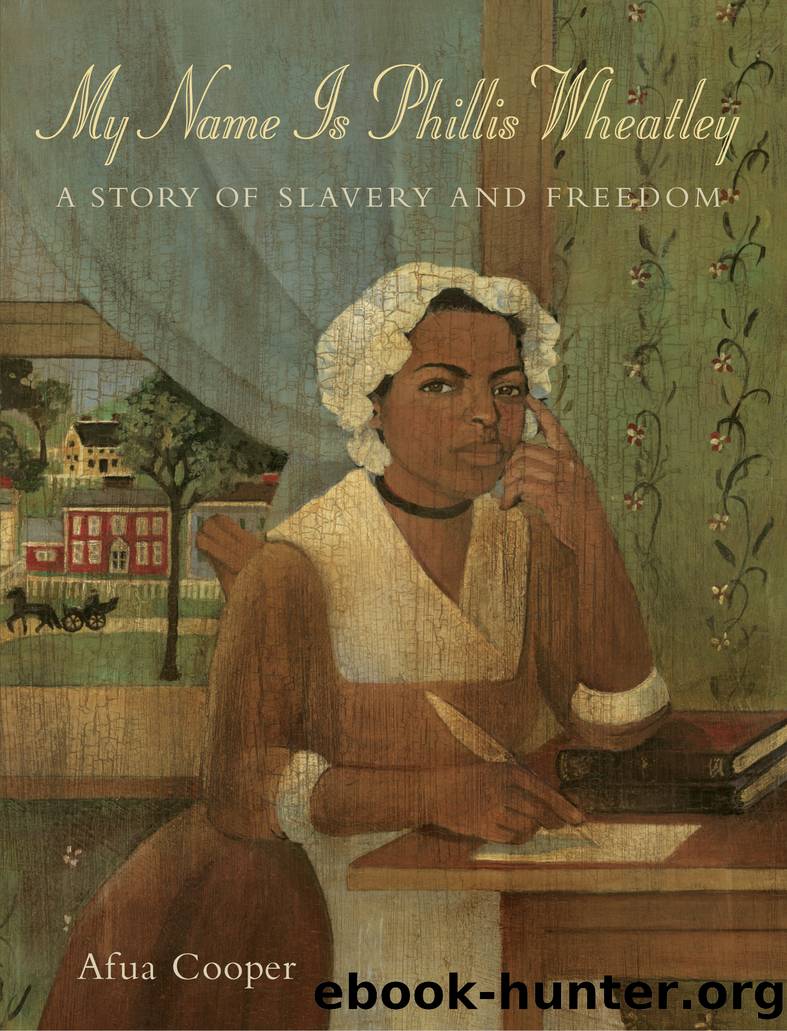My Name is Phillis Wheatley by Afua Cooper

Author:Afua Cooper [Cooper, Afua]
Language: eng
Format: epub
Tags: Children's Fiction
ISBN: 9781525308284
Publisher: Kids Can Press
Published: 2009-09-02T00:00:00+00:00
CHAPTER EIGHT
The Making of a Poet
My first poem to be published was âOn Messrs Hussey and Coffin.â It told the story of two Nantucket gentlemen who were on their way to Boston when their ship sailed into a hurricane off Cape Cod. They narrowly escaped death. The Wheatleys invited the two men to dinner one evening, and as I served them I heard them tell their story. Shipwrecked and near death. I knew these well from my journey on the slave ship Phillis. In my mindâs eye, I saw their ship pushed to and fro by Boreas, the god of the north wind, and Eolus, king of the four winds. Even as I served the gentlemen, the poem formed in my mind. At the close of the evening, the words simply flowed through my fingers onto paper.
Did fear and danger so perplex your Mind,
As made you fearful of the Whistling Wind?
Was it not Boreas knit his angry Brow
Against you? or did Consideration bow?
To lend you Aid, did not his Winds combine?
To stop your passage with a churlish line,
Did haughty Eolus with Contempt look down
With Aspect windy, and a studyâd Frown?
My mistress was so impressed that she sent the poem to several New England newspapers. The Newport Mercury of Rhode Island published it on 21 December 1767. I was thirteen years old. Soon all of Boston was speaking of the âNegro poetess, slave of Mr. Wheatley.â
I wrote poem after poem. Mistress was proud of my achievements and organized small readings and performance parties for the cream of Boston society. My first reading was at the Wheatleysâ. Mistress and Master invited a few guests, among them Governor Thomas Hutchinson and the distinguished Reverend Samuel Cooper (our next-door neighbor). I was nervous, but Mistress told me to believe in the power of my own verse, and the guests were encouraging.
It was one thing to read to the Wheatleys, but quite another to read in front of others. My tongue felt like lead in my mouth. Nervousness made me read in a squeaky voice. But that did not seem to matter. What mattered was that I, a slave, had written the poems. Many found this unbelievable, and most thought of me as an oddity, as my mistressâs great experiment: the slave who was a poet. The slave who recited poetry. What a curiosity!
But many people were kind. Reverend Cooper gave me a book of John Donneâs poetry, and Governor Hutchinson gave me a text on rhetoric. Invitations abounded for me to give recitals in the homes of Bostonâs finest. Sometimes, my mistress or master received a small sum of money for my performances. In the summer, when the Wheatleys, like other fashionable Bostonians, retired to Newport to escape Bostonâs stifling heat, I gave readings in the homes of Newportâs high society. Yet, for all the adulation, though I was a âgenius,â I was still an African, a slave, and not their equal. How could they say I had a âsuperiorâ mind and then refuse me a place at their dining table? The slaves took great pleasure in my recitals.
Download
This site does not store any files on its server. We only index and link to content provided by other sites. Please contact the content providers to delete copyright contents if any and email us, we'll remove relevant links or contents immediately.
Ariel (english and spanish Text) by Sylvia Plath(728)
Juanita Fights the School Board by Gloria Velásquez(723)
Pathfinders by AL-KHALILI JIM(635)
Rebel Ideas by Matthew Syed(608)
Pop 1280 (1990) by Jim Thompson(545)
The Autobiography of Martin Luther King, Jr. by Unknown(518)
Planting Stories: The Life of Librarian and Storyteller Pura Belpre by Denise Anika Aldamuy(499)
Up from Slavery: An Autobiography (Annotated) by Booker T. Washington(474)
My Mexico by Diana Kennedy(459)
Bury Me (Willow Heights Prep Academy: The Elite Book 3) by Selena(423)
I Am a Girl From Africa by Elizabeth Nyamayaro(417)
Story of a Shipwrecked Sailor (Vintage International) by Gabriel GarcÍA MÁRquez(405)
101 Awesome Women Who Changed Our World by Louise Wright(396)
Lives of the Artists by Kathleen Krull(391)
Young Bucks by Matt Jackson & Nick Jackson(385)
The Collected Stories of Katherine Anne Porter by Katherine Anne Porter(375)
Glow by Tim Jordan(374)
Who Was Maria Tallchief by Catherine Gourley(369)
Rad Women Worldwide by Kate Schatz(362)
